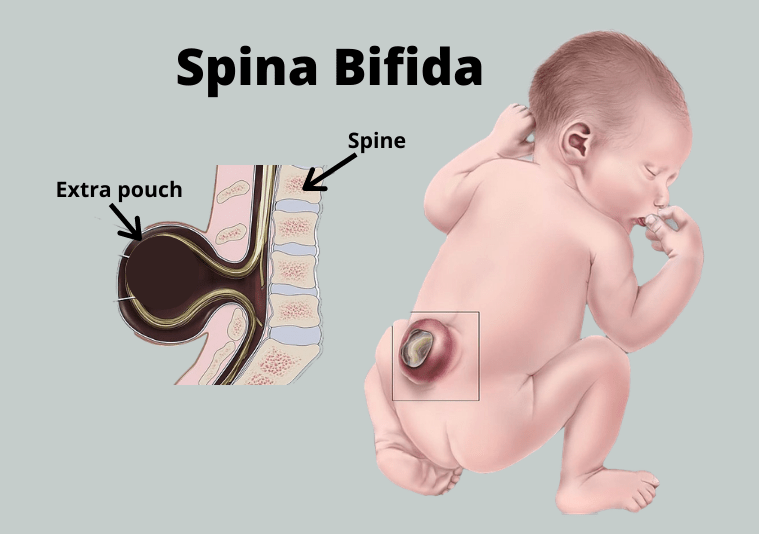This is an article from the Safe Pregnancy in Epilepsy patient guide.
Seizure medications can cause birth defects. It is important to choose one of the seizure medications safe in pregnancy.
The safest antiepileptic in pregnancy needs to be carefully selected for each woman. It needs to minimize both seizures and birth defects.
Valproate has the highest risk of causing birth defects. In terms of lowest risk of birth defects, Lamotrigine and Levetiracetam are the antiepileptics safest in pregnancy.
Table of Contents
Which is the safest antiepileptic in pregnancy?
There are two goals of epilepsy management during pregnancy:
- Prevent birth defects (teratogenicity)
- Prevent seizures
In terms of preventing birth defects, Lamotrigine & Levetiracetam are the safest antiepileptics in pregnancy.
But to select the safest antileptic for you, we need to make sure your seizures are controlled. So, your doctor may advise you to take a different medication.
What is “Teratogenicity”?
When the sperm and egg unite, a single cell is created. Like a miracle, this single cell divides & forms arms, legs, heart, brain and other organs.
Here is a video of this process:
Let us quickly summarize:
- First 3 months – Basic organs develop. The basic spinal cord forms within 2 months.
- 3-6 months – The brain, spinal cord and heart start becoming more complex.
- 6-9 months: All organs and the baby itself rapidly increases in size!
Seizure medications can cause birth defects such as a small head, or improperly formed lips. “Teratogenicity” it the medical term for this problem.
We want to minimize this problem. Is there a medication labelled the “safest antiepileptic in pregnancy”? Let’s read more.
What structural problems can seizure medications cause?
Seizure medications can produce many kinds of structural problems. But the most common ones are:
- Incorrect formation of the heart – For example: an incorrect hole (ASD, VSD) etc
- Incorrect formation of the lips and mouth – Cleft lip
- Incorrect formation of the spinal cord – Spina Bifida
- Incorrect formation of the brain – e.g. too small – microcephaly
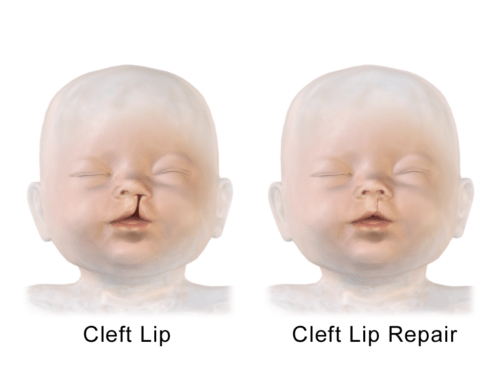
Other problems such as kidney problems are less common.
The very important things to realize are:
- Problems with the brain and spinal cord are more serious. Even more serious than heart problems (most heart problems are fixable).
- The first 3 months are a critical period of spinal cord and brain formation.
- So, start taking steps to reduce this risk BEFORE YOU GET PREGNANT.
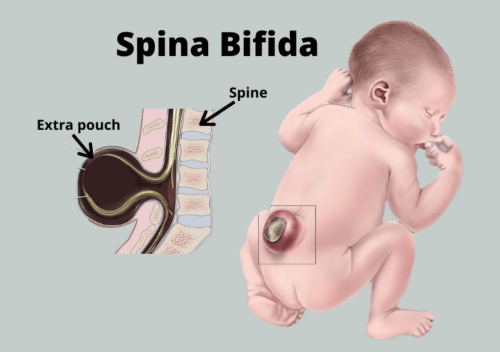
How can you reduce risk to the baby?
There are less safe seizure medications, and there are – relatively speaking – seizures medications safe in pregnancy.
Newer medications like levetiracetam top the list of seizure medications safe in pregnancy. When it comes to avoiding birth defects, Levetiracetam (along with lamotrigine) is probably the safest antiepileptic in pregnancy.
Please realize one critical thing:
If you have a big generalized convulsion then both your and your baby’s life are at risk. Therefore, you HAVE to keep taking seizure medications during pregnancy.
You need to plan your pregnancy properly (see below). Unplanned pregnancies in Epilepsy are common. Seizure medications can make oral contraceptives ineffective. Therefore, use condoms to prevent pregnancy.

Meet your doctor at least 1 year before you get pregnant. Ask him/her the following 6 questions:
- How likely am I to get seizures while pregnant?
- Can I change to a seizure medication that is safer for the baby?
- Can I take a lower dose of my seizure medication?
- Can I take fewer seizure medications?
- Should I start taking folic acid supplements?
- Do I need more frequent ultrasound or blood tests?
Let us talk about each of these questions.
How likely am I to get seizures while pregnant?
If you are seizure-free before pregnancy, you are unlikely to have seizures during pregnancy. Ideally, you should be seizure-free for one year before getting pregnant.

This also means that if your seizures are not controlled then you may want to delay your pregnancy. Give your doctor time to control them, before getting pregnant.
Can I change to one of the seizure medications safe in pregnancy?
Some medications are not in the list of seizure medications safe in pregnancy. These tend to be the older seizure medications.
Of the seizure medications safe in pregnancy, levetiracetam is the most commonly used one. As far as avoiding birth defects is concerned – Levetiracetam is (along with lamotrigine) the safest antiepileptic in pregnancy.
But here is a critical point.
When you select seizure medications safe in pregnancy, the one you choose has to control your seizures AND minimize risk to the baby. For you, that is the safest antiepileptic in pregnancy.
Let us look at this table:
| Least safe | Less safe |
|---|---|
| Valproate Phenobarbital Carbamazepine Phenytoin | Carbamazepine Oxcarbazepine |
And this one:
| More safe | Safety not clearly known |
|---|---|
| Levetiracetam Lamotrigine | Zonisamide (probably safe) Lacosamide (probably safe) Gabapentin (proabbly safe) Clobazam & clonazepam (probably slightly unsafe) |
Out of all these medications, Valproate is the least safe seizure medication in pregnancy. Valproate causes malformations in about 10% of babies. The flip-side of course is that (even with this medication) ~90% of babies have no such problems.
Talk to your doctor if you are taking medications in the “least safe” column. Ask your doctor whether you can try one of the “More safe” medications instead.
Often, such a switch is reasonable to attempt.
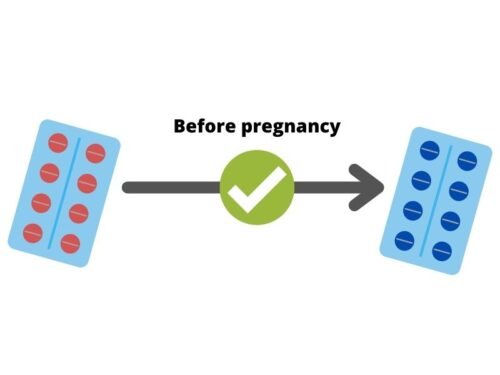
Sometimes, the answer may be “No, there would be a very high risk of seizures”. Remember: When you select a seizure medications safe in pregnancy, the one you choose has to control your seizures AND minimize risk to the baby.
This answer can depend on the type of your Epilepsy.
For example:
Let’s consider JME, a common type of epilepsy. In JME, switching from Valproate (Least safe) to Levetiracetam (More safe) is usually possible.
Remember: After a switch, be seizure-free for 1 year before getting pregnant.
Should you change to seizure medications safe in pregnancy AFTER getting pregnant?
Almost always, the answer to this question is No.
Once you get pregnant, it is usually best to continue with your current medication.
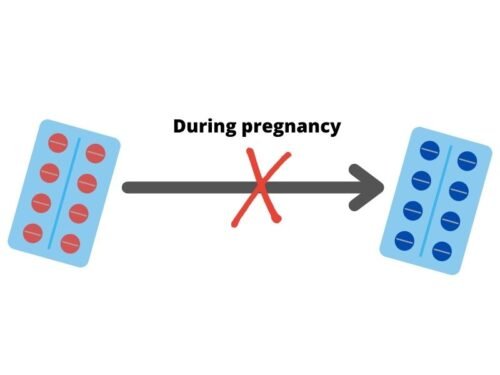
The American Academy of Neurology (AAN) guidelines discuss this problem. Switching seizure medications after getting pregnant is usually not a good idea because:
- You could lose control of your seizures.
- While changing from one medication to another, the baby is exposed to two different medications. This increases the chances of harm.
- The important organs (especially the brain and spinal cord) develop early in pregnancy. By the time most women go to a doctor, changing seizure medications does not prevent harm to baby.
You might be tempted to search for the safest antiepileptic in pregnancy, and then change over to it even during pregnancy. But remember that preventing seizures is equally important.
Can I reduce the dose of my medication?
You should never change your medications or reduce them by yourself. Having a seizure can be dangerous to both you and your baby.
Taking a smaller dose may reduce harm to the baby. BEFORE becoming pregnant – ask your doctor if you can try reducing the dose.

Your doctor may give you the option to try a smaller dose. Sometimes, the answer to this question may be a polite “No, the risk of seizures would be too high”.
During pregnancy, even if you are taking one of the seizure medications safe in pregnancy, your doctor will check your blood levels. If the blood level is low, your doctor may increase the dose.
Can I take fewer seizure medications?
Taking two or more seizure medications may be more harmful for the baby. In fact, taking a higher dose of just one medication may be safer than taking many medications.

Talk to your doctor. Perhaps he/she may reduce the number of your seizure medications. Monotherapy (only one medication) is safest for the baby. Ideally, this should be one of the seizure medications safe in pregnancy.
Should I start taking folic acid supplements?
Folic acid is a vitamin. It reduces the risk of the baby developing brain and spine problems.
Usually, women with epilepsy trying for pregnancy should take folic acid. Talk to your doctor whether you should start taking it.

Your doctor may ask you to:
- Take it at least 1 month before you try for pregnancy.
- Take a slightly higher dose – up to 5 mg every day.
- Keep taking it during pregnancy – at least in the first 3 months.
Some doctors believe that even a smaller dose (1 mg/day) is enough. But most doctors think the higher dose provides even more protection. For example – the CDC (Center for Disease Control, USA) recommends 4 mg/day.
Along with a personalized selection of the safest antiepileptic in pregnancy for you, starting you on folic acid supplementation is critical.
Should I have more frequent Ultrasound scans?
Women who are on seizure medications may have more frequent & detailed ultrasound scans. This is called “enhanced prenatal screening“.
The exact frequency of enhanced prenatal screening differs from place to place.
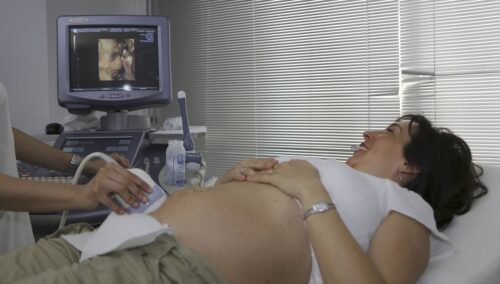
In some cases, blood tests and biopsies may detect abnormalities before birth as well. Click here for a description of such tests.
Detection of major deformities before birth give you some time to think. Based on this information, you can choose whether to continue with pregnancy.
Summary:
- Seizure medications can cause birth defects due incorrect formation of the baby. “Teratogenicity” is the medical term for this problem.
- Some seizure medications (for example Valproate) are more likely to cause birth defects.
- In terms of reducing birth defect risk, Lamotrigine and Levetiracetam are probably the safest antiepileptics in pregnancy.
- But the safest antiepileptic in pregnancy is one that prevents both birth defects AND SEIZURES. For you, the safest antiepileptic during pregnancy may be a different medication.
- Discuss these issues with your doctor at least 1 year before you try for pregnancy.
- Optimizing seizure medications & folic acid reduces the risk of teratogenicity.
- More frequent ultrasounds are usually advised for women taking seizure medications.
- Be sure to read the “Safe Pregnancy in Epilepsy Checklist”.
Keywords – Antiepileptic Drugs and Pregnancy Outcomes, safest seizure medication for pregnancy, drug of choice for epilepsy in pregnancy mcq, which drug is contraindicated in epilepsy and pregnancy, side effects of antiepileptic drugs in pregnancy, list of antiepileptic drugs in pregnancy, is phenobarbital safe in pregnancy, is carbamazepine safe in pregnancy, is phenytoin safe in pregnancy
| Caution: This information is not a substitute for professional care. Do not change your medications/treatment without your doctor's permission. |
 Dr. Siddharth KharkarDr. Siddharth Kharkar has been recognized as one of the best neurologists in Mumbai by Outlook India magazine and India today Magazine. He is a board certified (American Board of Psychiatry & Neurology certified) Neurologist. Dr. Siddharth Kharkar is a Epilepsy specialist in Mumbai & Parkinson's specialist in Mumbai, Maharashtra, India. He has trained in the best institutions in India, US and UK including KEM hospital in Mumbai, Johns Hopkins University in Baltimore, University of California at San Francisco (UCSF), USA & Kings College in London. |
 Skip to content
Skip to content
